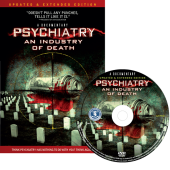RESTORING DIGNITY
CITIZENS COMMISSION ON HUMAN RIGHTS

Citizens Commission on Human Rights (CCHR), a nonprofit charitable mental health watchdog organization established by the Church of Scientology in 1969, is dedicated to eradicating psychiatric abuses and ensuring patient protections. CCHR has supported enactment of more than 160 laws protecting individuals from abusive or coercive psychiatric practices, requiring informed consent for psychiatric treatment, ending enforced drugging and electroshocking of children and mandating severe penalties for sexual abuse of patients by psychiatrists and psychologists.
With headquarters in Los Angeles, California, CCHR International guides a global human rights advocacy network of some 200 chapters across 34 nations. CCHR Commissioners include physicians, psychiatrists, psychologists, lawyers, legislators, government officials, educators and civil rights representatives. CCHR International also houses a museum presenting the history that shaped centuries of psychiatric brutality.
CCHR distributes documentary films that expose the varied channels of psychiatric abuse: the destructive consequences of screening and labeling individuals and prescribing psychotropic drugs; the profit-driven alliance between psychiatry and the pharmaceutical industry; the lack of science behind psychiatry’s diagnoses; and the proliferation of drugging of active-duty military and veterans that is driving up noncombat deaths by sudden cardiac arrest and suicide.

ENDING PSYCHIATRIC TORTURE IN
NEW ZEALAND



In 1984, the United Nations Convention Against Torture declared war on the torture perpetrated by hate groups, drug cartels, terrorists, and repressive governments. However, it omitted from the spotlight the brutality inflicted by psychiatrists. As a result, in many countries, psychiatrists who maim and kill patients have operated with no government oversight.
In New Zealand, CCHR launched an investigation into the Adolescent Psychiatric Care Unit of Lake Alice psychiatric hospital. CCHR investigators found that children detained as wards of the state were punished with electroshock, forcibly drugged and held in isolation. Government and police agencies were indifferent to complaints, so CCHR discovered nearly 100 cases of teenagers who had been subjected to mental and physical torture at the psychiatric facility. Media exposés followed and the resultant public outcry led to the permanent shuttering of Lake Alice.
With the assistance of CCHR, 900 former patients filed complaints. In the end, the courts upheld the rights of the victims and the New Zealand government issued a written apology and paid $10.7 million in compensation.
CCHR lobbied for effective government oversight of psychiatrists and when they again met inaction, filed a detailed report with the United Nations Committee Against Torture at UN headquarters in Geneva. So it was that in May 2013 a UN investigation team arrived in New Zealand for the first official UN examination of the country’s places of detention.
In March 2014, the New Zealand Ministry of Justice at last complied with UN mandates, establishing independent oversight of all psychiatric facilities in the country. It further permitted patients to report psychiatric abuses directly to police who were bound by the agreement to investigate those complaints.
CCHR’s efforts have helped bring psychiatry in New Zealand firmly and decisively under the law.
“CCHR is commended for securing numerous reforms around the world,
works diligently to safeguard others from abuses in the mental health system, and ensures that legal protection are afforded to mental health care patients.”
“I am pleased to extend congratulations to the Citizens Commission on Human Rights (CCHR) for its efforts over forty years to investigate and expose psychiatric violations of
human rights. I am particularly appreciative of CCHR members’ and supporters’ hard work in support of legislative efforts to protect children.”

HUMANITARIAN MISSION
BRINGING PSYCHIATRY UNDER THE LAW
As a key element of its humanitarian mission to protect individuals from psychiatric abuses and to clean up the field of mental health, Citizens Commission on Human Rights members work vigorously to ensure that the legal system serves all citizens—including those caught in the undertow of psychiatry.
In that pursuit, CCHR has contributed to the passage of more than 160 laws in states across the United States and 16 nations. Legislation ranges from protecting children from psychotropic drugging, safeguarding the elderly from abusive treatment, stopping psychologists’ and psychiatrists’ sexual abuse of their patients, defending the rights of the disabled and mentally ill, and requiring psychiatric transparency as a safeguard against fraud and corruption. CCHR members have testified before the United States Congress and Parliaments in Japan, France, Holland, Germany, South Africa, Italy, and many more, steering legislation in the direction of defending dignity and saving lives.
“CCHR serves as a stellar example of the united power of individuals who achieve reform through dedicated efforts to better society and effective education and advocacy.”
“I join with Congress in recognizing the Citizens Commission on Human Rights for its longstanding commitment to advancing the fundamental freedoms set forth in the Universal Declaration of Human Rights and the Nuremberg Code. CCHR serves as a stellar example of the united power of individuals who achieve reform through dedicated efforts to better society and effective education and advocacy. We recognize CCHR for the many great reforms it has championed, which today protect individuals against cruel, inhumane and degrading treatment and for its leadership role in raising public awareness so that dignity and human rights can be returned to all men.” —Member of U.S. Congress, California



